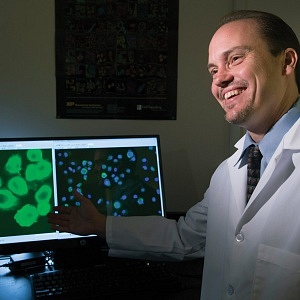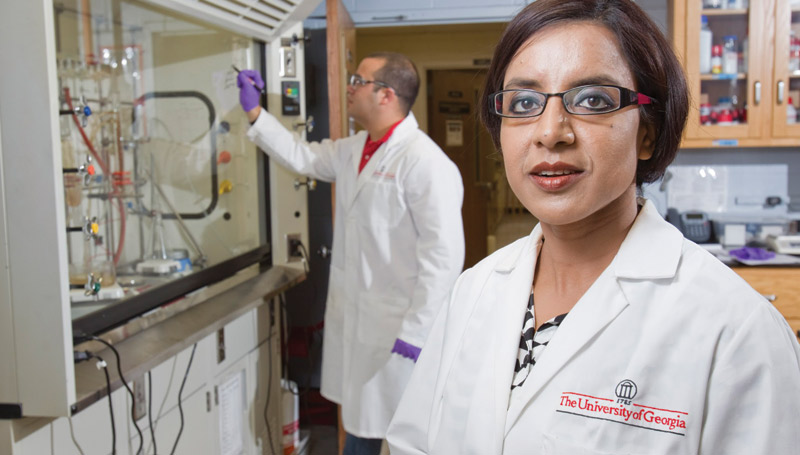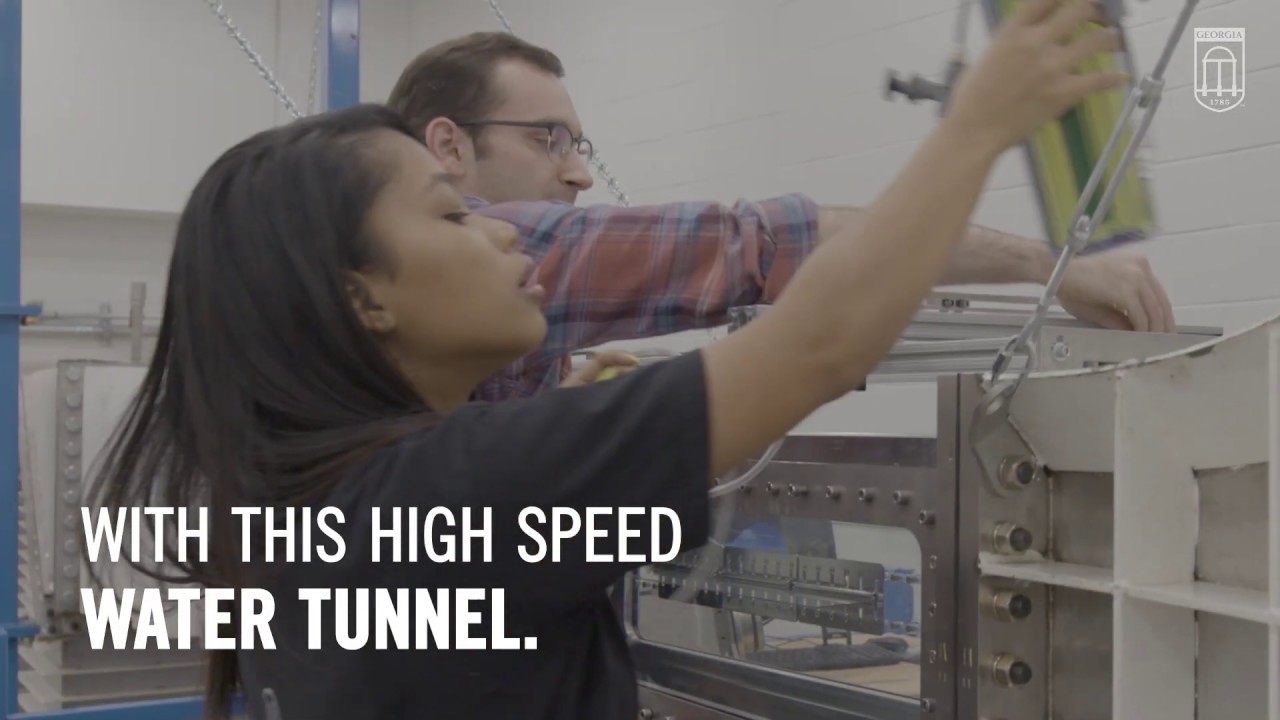The careers of alumni Kirby Alton and Rick Shimkets were shaped by their love of science and their work in the lab as students at the University of Georgia, which ultimately connected them with the university’s efforts to commercialize research discoveries.
In the early 1970s, Alton (BS ’74, PhD ’81) was tapped by a faculty member to work as a lab technician. It was a good opportunity for the zoology major, who at the time was waiting tables downtown at The Peddler Steakhouse. Experimenting in the lab ignited the curiosity of the South Georgia farm boy, leading him to earn a doctorate in genetics.
“The timing was perfect because it was the beginning of biotechnology,” he recalls. “I had an interest in genetics, and the professors pulled me into the labs.”
Twenty years later, a teenaged Rick Shimkets (BS ’93) took a summer job in a microbiology lab supervised by his older brother, Larry, a UGA professor. He fell in love with the campus and returned to complete his undergraduate degree in genetics before heading to Yale University for a doctorate in human genetics.
Both men enjoyed successful careers in the biopharmaceuticals industry. Alton was on the initial team of scientists at biotech pioneer Applied Molecular Genetics—now Amgen—a company that today accrues more than $20 billion in annual revenues; he retired as senior vice president of development in 1999. Shimkets is the former vice president of drug discovery and scientific development for the CuraGen Corporation, which was sold to Celldex Therapeutics for $94.5 million in 2009.
Today, thanks to Innovation Gateway, the university’s technology transfer program, the two are leaders of Abeome, a startup company based on science developed by Rich Meagher, Distinguished Research Professor of Genetics in the Franklin College of Arts and Sciences. Abeome is poised to make an impact on the booming antibodies market through its AbeoMouse technology, which creates antibodies targeted to autoimmune diseases such as asthma and psoriasis and holds promise for the treatment of cancer.
Such discoveries could potentially languish in a lab without the support of Innovation Gateway, a program that encompasses the technology licensing and startup support functions of the university’s research enterprise, which until recently had operated as two separate entities, the Technology Commercialization Office and the Georgia BioBusiness Center. The units were combined in 2015 to better facilitate the commercialization of innovative UGA technologies.
Innovation Gateway’s director, Derek Eberhart (BSA ’86, MS ’91), describes it as an in-house team of experts that helps UGA researchers commercialize their discoveries.
“The land-grant mission drives our process,” he says. “We focus on the research breakthroughs coming out of the university that might benefit the public and strive to facilitate the process of moving those discoveries into the marketplace.”
But tech transfer isn’t as easy as flipping a switch.

Alton—executive chairman of Abeome who spent years developing products at Amgen—notes that most discoveries come out of research universities because private industry simply cannot afford the trial and error associated with science. The university’s ability to capitalize on such discoveries makes it possible to reinvest in research.
“The idea is to commercialize the science here and not have it go to California or to somewhere else,” he explains. “The university was founded for that purpose, to educate the people of the state and create opportunities.”
Statistics show it’s working, with an estimated economic impact of $100 million in Georgia from jobs created by products and companies within the program’s pipeline, according to a study conducted by UGA economist Jeffrey Dorfman.
Some of the best examples of products to come out of Innovation Gateway are in the agriculture, poultry and biomedical industries. UGA is a leader in the development of new peanut, blueberry and turfgrass varieties, the latter taking center stage at global sporting events such as soccer’s World Cup. While these staples are a key component of what Innovation Gateway does, Eberhart points out there is more to the story.
“Plant varieties and biomedical products generate significant revenue, but there are a wide variety of products and companies based on UGA research,” he says. “UGA has the most diverse, comprehensive research portfolio in the state of Georgia and our commercialization
pipeline reflects that diversity.”
In fact, the university consistently ranks in the top 10 of all U.S. universities for total licenses and option agreements executed as well as for the number of active licenses, according to the Association of University Technology Managers. The statistic offers a good measure of UGA’s success in partnering with industry to move new discoveries and technologies to the marketplace, Eberhart says.
A chief goal of Innovation Gateway is to expand opportunities to partner with industry, according to David Lee, vice president for research.
“UGA takes great pride in its success in moving new field and laboratory discoveries into the market through partnerships with industry. With UGA’s growing research enterprise we can look forward to having success across a broader spectrum of market sectors, ranging from human medicine, bioengineered microbes and poultry vaccines to cybersecurity software and educational tools,” he says.
The Innovation Gateway team fosters discoveries into market-focused products that both make money and serve the greatest good. Fifty-five new products were introduced in fiscal year 2015. The team consists of commercialization professionals with advanced scientific degrees and industry experience who evaluate inventions for patentability and commercial potential, work with patent attorneys to secure intellectual property rights, identify industry partners and negotiate agreements.
[blockquote pull=”” align=”left” attributed_to=”” attributed_to_url=”{{attributed_to_url}}”]I could have gone into medicine and become a doctor and maybe helped thousands of people in my lifetime, but if you develop a drug, you can help millions.”[/blockquote]Services also include access to its incubator program, which provides startup support services, seed funding and mentoring to early-stage companies with established research relationships with UGA.
Abeome, for example, is able to lease office and lab space on campus, benefitting from infrastructure and technology that otherwise would be prohibitively expensive for a startup, notes Shimkets, the company’s president and CEO.
“No small company has the capital to buy one of these machines,” he explains of cell-sorting equipment housed in the Paul D. Coverdell Center for Biomedical and Health Sciences. “And even if we did, the maintenance and the service upgrades would just destroy you. We pay to use these machines—on the order of $100 or $200 an hour—but these are million dollar machines.”
Technological and business startup support are critical to giving discoveries a leg up in the commercial world, as Shimkets can attest. He notes that even the most brilliant researchers may not be well-versed in how to create a successful for-profit venture.
“Innovation Gateway brings together people with experience—from corporate attorneys to accountants—who can teach the basics of what a company is and how it’s done,” he says.
The process of building a sustainable company takes time and money, but the investment is worth it, exemplified in the success of UGA startup company Synageva, acquired by a major pharmaceutical company in 2015 for more than $8 billion. Founded around technology developed in the UGA Genetics Department, the company focuses on developing treatments for several rare human diseases.
Making the world a better place through groundbreaking science and medicine is an important mission for the university and researchers alike.

“Being able to translate what we do into actually helping people directly is what I’ve been interested in from the beginning of my career,” Shimkets explains. “I could have gone into medicine and become a doctor and maybe helped thousands of people in my lifetime, but if you develop a drug, you can help millions.”
For his colleague and fellow scientist Alton, returning to the lab through Innovation Gateway has been a way to give back to the institution.
“I really feel a lot of my success was due to the university, the opportunities I had here and the people who saw promise in me and took the time,” he says. “There’s a debt there. This is one opportunity for me to pay it back.”
Alton resides primarily in California and Montana but keeps a condo in Athens for when he’s in town on Abeome business or to attend board meetings of the University of Georgia Research Foundation. The native Georgian enjoys coming home—especially in springtime or during football season.
“Obviously I’m a Bulldog,” he says with a smile. “I love walking around here—I can pretend like I’m 20 years old again. There’s always that attraction to the place where you come of age and grow up.”






